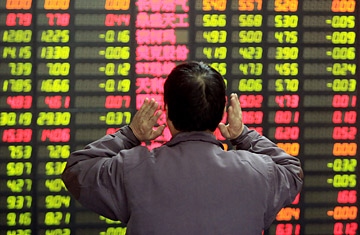
An investor reacts as he looks at the stock price monitor at a private securities company in Shanghai, China.
Relative calm returned to global bourses Tuesday following Monday's battering. Asian markets closed slightly down, while European indices reflected modest opening gains. But many observers see Tuesday's lull as little more than a break between rounds in a particularly brutal boxing match. "The markets certainly got a breather today," says Kirby Daley, senior strategist at financial services firm Newedge Group in Hong Kong, of Tuesday's respite. "(But) I believe it will be short-lived."
Japan's Nikkei fell to a near 26-year low before rebounding and closing down just 0.7% on Tuesday. Hong Kong's Hang Seng retreated 2.3% and Shanghai's main index dropped 1.1%. Seoul's KOSPI, however, finished up 0.7%, with Taiwan's index also slightly higher. (See pictures of the global financial crisis.)
Most European markets opened to small gains Tuesday, before wavering between green and red. By noon, London's FTSE 100 was down 1.2%, Paris' CAC was up 0.35 %, and Frankfurt's DAX was virtually flat.
Overnight futures trading suggested that Wall Street would open to less bearish trading than the sell-off that fueled its 4.24% loss Monday. But observers warned against looking to daily, weekly, or even monthly market activity for signs of where they or the stocks traded on them are headed. The reason? First off, if the selling frenzies that sent indices plunging by roughly 50% over the past year were initially driven by fears of possible collapse of global finance markets, that panic is now mostly being inspired by the world's dismal economic outlook. Because of that, many experts say, traders are coming to work scared, and looking for signs to confirm that terror. "Markets have lost points of reference, and are now acting on a combination of mega-pessimism and hyper-speculation," says Marc Touati, director general of Global Equities in Paris. "Meaning, when they get bad news justifying that outlook, there's mass movement downward disproportionate to the negative information markets are acting on."
But that self-fulfilling spiral also means relative calm can follow bouts of chaos. Though the causes of Monday's global sell-a-thon remain unchanged, by Tuesday markets had mostly digested it all — and began looking for ways to pick up, muddle on, and possibly find a deal to be had in dumped stock. One reason for the bargain hunting is that investors know inordinately depressed markets mean there are deals to be had. "Half of the companies on Paris' CAC 40 have seen their stock fall to less than their equity capital — which makes no economic or financial sense," Touati says. "markets usually move in anticipation of the way the economy is changing. That situation is now reversed: markets are simply following economic changes — or more accurately, how they think the economy has changed. Their forward vision, therefore, is virtually zero."
For that reason, economist Touati says it's virtually impossible to make any credible market forecasts until investors and traders swap panicked reaction for their usual economic analysis and anticipation. When might that happen? Possibly sometime between spring and early summer, when the first signs of modestly positive economic data is expected out of the U.S.
"There's lots of cash that's been tucked away around the world by people whose profit-taking will lift markets after big sell of periods, but that won't change the big picture," Touati says, "Only signs the U.S. has hit bottom and on the rise again will fuel a real rebound of international stock markets."
— With reporting by Anka Lee and Michael Schuman / Hong Hong
